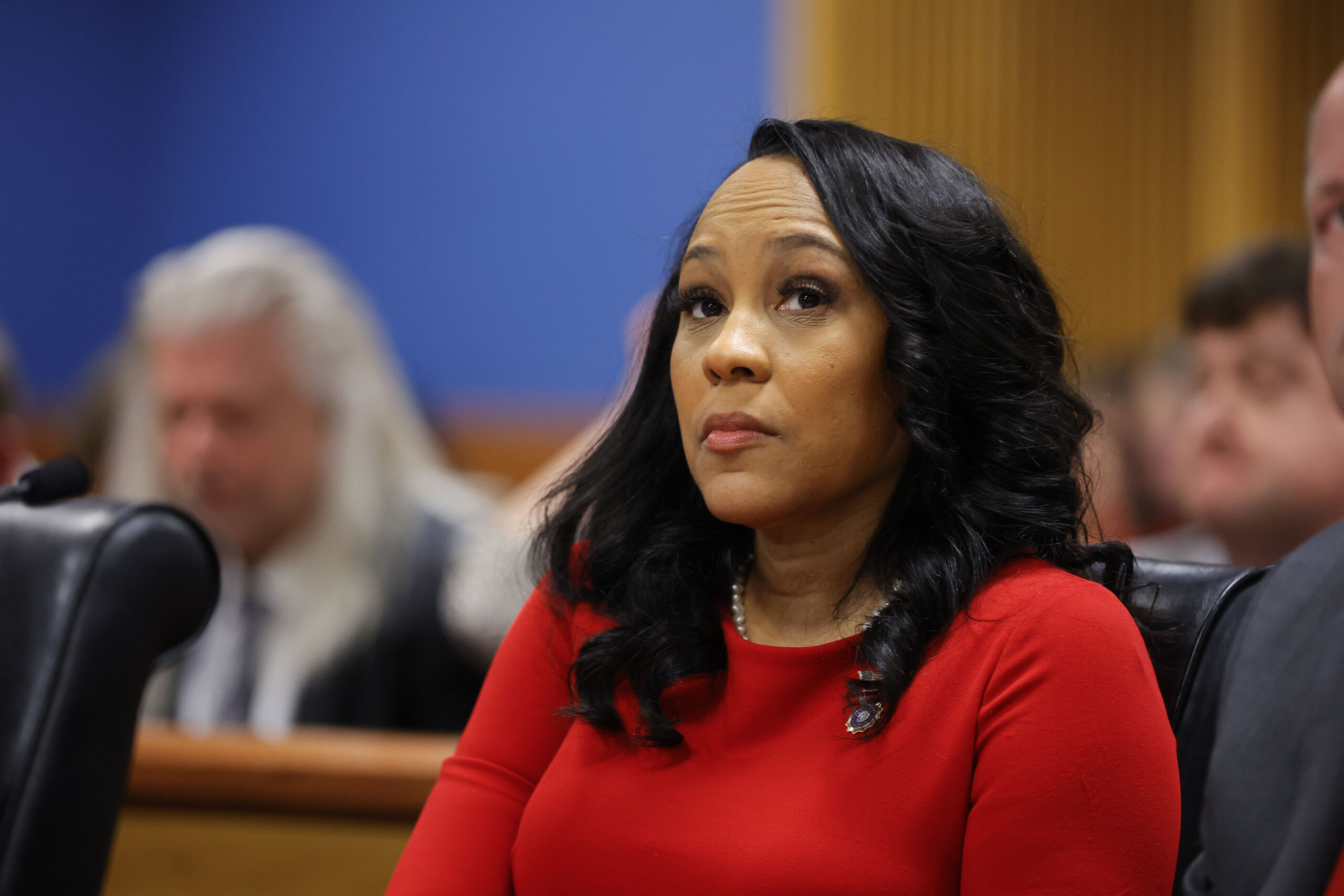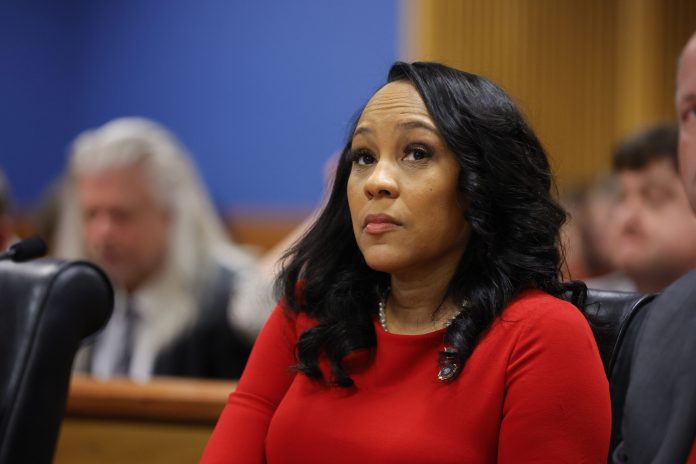
Fulton County District Attorney Fani Willis arrives during a hearing on the Georgia election interference case, on Friday, March 1, 2024, in Atlanta. (AP Photo/Alex Slitz, Pool)
The state presented its closing arguments late Thursday afternoon in the multi-day hearing to determine whether to disqualify Fulton County District Attorney Fani Willis from the racketeering (RICO) and election interference case she brought against Donald Trump.
The sum and substance of those removal efforts amount to claims that Willis began dating Nathan Wade sometime in late 2019, eventually hired him for the high-profile case in November 2021, reaped something not entirely unlike a financial windfall from Wade’s billable hours, and then worked to cover-up the scheme-like affair.
Willis sat down at the prosecution’s table during a brief recess after nearly two hours spent by attorneys representing a handful of the remaining 15 co-defendants in the sprawling RICO case. But while the defense had smooth sailing rehashing their arguments, the judge overseeing the case decidedly gave the state a harder time.
Prosecutor Adam Abbate began the state’s arguments by pushing back on testimony from defense witness Robin Yeartie, a former employee of the district attorney’s office who said she and Willis had long been “best friends.” During the first day of the hearing, Yeartie testified Willis and Wade first became romantic in late 2019.
“It’s absurd,” Abbate said of Yeartie’s testimony that she had conversations with Willis about the relationship with Wade on three separate occasions in 2019, 2020, and 2021. “It’s absolutely absurd.”
During the state’s closing, Abbate formalized the position of the district attorney’s office that the romantic relationship between Wade and Willis began sometime “around March of 2022.”
Later, the state made reference to Yeartie’s attorney attempting to get his client out of testifying during a separate-but-related hearing on motions to quash defense subpoenas. That prior hearing ended with a defense victory as Fulton County Superior Court Judge Scott McAfee refused to quash the subpoenas and ruled: “It’s possible that the facts alleged by the defendant could result in disqualification.”
Abbate’s reference to that hearing, however, went nowhere for the state because Yeartie’s attorney’s comments were never introduced into evidence in the broader hearing and because the prosecutor’s argument also opened the door for a logical inference that ultimately favored the defense’s narrative about the relationship timeline.
“She was fighting not to come in here and testify at all, and then she comes in here and testifies, why would she come in here and testify the way she did?” McAfee asked, referring to Yeartie.
The state responded in a two-fold manner: arguing that Yeartie was both afraid of testifying in a highly public hearing against a former friend and that she was biased against Willis over the still-disputed circumstances of her departure from the district attorney’s office.
McAfee was clearly not taken in by the argument.
“But if we’re going to draw inferences based on her fighting the subpoena, why would she have fought it if she had such a bias and wanted to say these untruths?” the judge asked the state’s attorney.
Abbate struggled before giving a halting answer that reprised the notion that Yeartie wouldn’t want to be part of a high-profile trial.
The state also made a broadside effort to categorize the defense’s understanding of the legal standard for disqualification as off-base.
“The defense has to show an actual conflict,” Abbate argued. “You must find that there is an actual conflict.”
Earlier in the day, defense attorneys, led by John Merchant, argued that even an appearance of a conflict of interest is sufficient for the disqualification of prosecutors in Georgia. Other defense attorneys reiterated this point by noting that state’s attorneys are held to a higher standard to undergird public confidence in the legal system.
Abbate said the defense “misstates the law” about the appearance of a conflict of interest being the standard for disqualification.
Again, McAfee seemed unimpressed by the state’s line of reasoning, pointing out that multiple cases cited by the defense include the phrase “appearance of impropriety” as the standard to disqualify.
Abbate paused for several seconds before starting a sentence he was forced to stop as the judge spoke up to move proceedings along.
“There are a number of these cases that seem to exclusively rely on the appearance of impropriety,” McAfee told the state’s attorney.
Eventually, the state’s attorney proceeded to run through a series of citations. This briefing on case law was an effort to make the argument that each case using language about “appearance” actually, when considering the facts, concerned a genuine conflict of interest.
McAfee took issue with one of the cases the state cited.
In that case, the language at issue reads: “guarantees at least the appearance of a conflict of interest.” The judge said that phrase appears to be “very central to the holding in the case.”
Abbate, in response, said that language didn’t legally matter because the reviewing court found an actual conflict of interest.
The judge said the court did not make any such finding.
“I would disagree with your honor,” Abbate mustered in response.
Later, McAfee felt the need to correct Abbate yet again.
Allegations that Willis extracted a financial boon during her relationship with Wade are little more than “speculation and conjecture,” the state argued, citing case law on disqualification.
“Aren’t we past the speculation and conjecture aspect of this, though?” the judge asked. “The core of the financial allegation was that there is a relationship and that money has changed hands. There’s maybe still an open question of where the ledger stands. But I think it was conceded that balance in one way or — in the district attorney’s favor.”
In other words, the judge disagreed with how the state categorized the fact of money changing hands between Willis and Wade.
This response suggests one major issue for the court is what to make of the documentation, and lack thereof, detailing how much money each prosecutor actually gave, or repaid, the other.
Have a tip we should know? [email protected]

